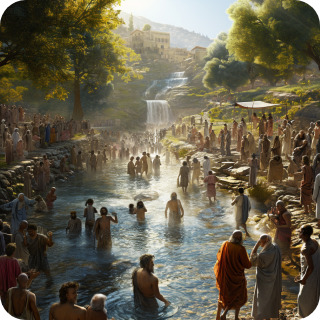
Matthew 3 - John the Baptist Prepares the Way
We are gong to jump ahead about 30 years from the time Jesus was born. Where was Jesus during this time period? Well, according to Luke 2:42, Jesus was 12 years old when he was teaching in the temple. Then, according to many scholars, Jesus traveled around Glastonbury England (a seaport in the Roman era), with his uncle Joseph of Arimatheia, who was a legal guardian of Jesus. Joseph was a rich merchant with a large fleet of ships that ran the tin trade for the Roman Empire, between England and the Mediterranean. Joseph of Arimatheia was better know as "the tin man." (No, not the one from the wizard of Oz). Many believe Jesus went to other countries during his young adult life, but there is no positive proof to confirm this. With that being said, Jesus was around 30 years of age, the same as John the Baptist who would soon baptize Him in the Jordan river.
1In those days came John the Baptist, preaching in the wilderness of Judaea, Again, John was about 30 years old at the time he began preaching his message. "He baptized people by immersing them in the river."
2And saying, Repent ye: for the kingdom of heaven is at hand. His message was for man to repent and turn to God for Heaven is near. (The purpose of baptism, is to repent, recognize and believe in the resurrection, and have a change of heart). (Mark 1:4, Luke 24:47, Acts 2:38, Acts 26:20, 2 Peter 3:9, Revelation 2:5).
3For this is he that was spoken of by the prophet Esaias, saying, The voice of one crying in the wilderness, Prepare ye the way of the Lord, make his paths straight. Isaiah the prophet spoke of John's ministry centuries before in the Old Testament (Isaiah 40:3).
4And the same John had his raiment of camel's hair, and a leathern girdle about his loins; and his meat was locusts and wild honey. If you ran into John the Baptist in those days, he would probably resemble a wild man. His clothes were woven from course camels hair, and he wore a large leather belt around his waist. "He ate locust and wild honey." Yes, it was legal for Jews to eat locust. (Leviticus 11:22).
5Then went out to him Jerusalem, and all Judaea, and all the region round about Jordan, People from Jerusalem, the Jordan valley and every section of Judea went out to the wilderness to hear John preach. "They loved him."
6And were baptized of him in Jordan, confessing their sins. People confessed their sins and John baptized them. (Mark 1:5). He was straight forward with his message of repentance, and many moved from their sin towards righteousness. (1 John 1:9).
7But when he saw many of the Pharisees and Sadducees come to his baptism, he said unto them, O generation of vipers, who hath warned you to flee from the wrath to come? The Pharisees were more orthodox believers. They believed in miracles, the Holy Spirit, the resurrection of the dead, but they would not believe in Jesus, "they rejected Him." The Sadducees mainly believed in the Torah (the first five books of the bible). They didn't believe in miracles or the resurrection, "they also rejected Jesus." But, why did John the Baptist call them a generation of vipers? Because they were; he was referring to the Kenites (Son's of Cain, or sons of the devil), who pretended to be Jews but were not, but rather from the synagogue of Satan. (Genesis 3:15, Matthew 12:34, 23:33, John 8:44, 1 John 3:10). John the Baptist knew who they were and what they wanted, and it wasn't to be baptized. They didn't like anyone teaching or preaching anything different than what they believed.
8Bring forth therefore fruits meet for repentance: John throws them a little challenge. "Prove you are not a false shepherd by your good teachings and deeds." Anyone can say they are saved and have changed their ways, but God wants it to be for real, "proof that it really comes from the heart." (Action speaks louder than words).
9And think not to say within yourselves, We have Abraham to our father: for I say unto you, that God is able of these stones to raise up children unto Abraham. Don't think you are going to get by saying; well, we are Jews, the descendants of Abraham. (Abraham means father of many nations, not the father of just the Jews). These Jews were counting on the acts of Abraham to save them, John is telling them they need more than that and need to repent, change their evil ways and turn to God. (i.e. forget the old stuff and get your act together). The Messiah is on His way, "get ready." If you are part of Christ as a believer, then you are part of Abraham's seed. And if ye be Christ's, then are ye Abraham's seed, and heirs according to the promise. (Galatians 3:29). If we are of Christ, then we are true descendants of Abraham, and all of the promises to him belong to us also. (Romans 8:17, 9:7, Hebrews 11:18).
10And now also the axe is laid unto the root of the trees: therefore every tree which bringeth not forth good fruit is hewn down, and cast into the fire. Judgment is coming! Remember that God is that consuming fire. (Hebrews 12:29). Anyone not producing good fruit will be cast into the lake of fire.
11I indeed baptize you with water unto repentance. but he that cometh after me is mightier than I, whose shoes I am not worthy to bear: he shall baptize you with the Holy Ghost, and with fire: One more worthy than John will come and baptize you with the "Holy Spirit." That would be Jesus Christ." Again, God is that consuming fire. Keep in mind, the "Holy Spirit" can warm you, but can also destroy any evil. The "Holy Spirit" would be poured out to all on Pentecost day. The "judgment fire" will be on judgment day when Christ returns at the second advent.
12Whose fan is in his hand, and he will throughly purge his floor, and gather his wheat into the garner; but he will burn up the chaff with unquenchable fire. This is the separating time for Christians. Jesus will separate the real followers from the ones who just say they are followers. (the hypocrites). Fan used here in the Greek is "Ptuon" a winnowing fork; as scattering like a spittle. A thrashing to separate the good from the bad. (Luke 3:17).
13Then cometh Jesus from Galilee to Jordan unto John, to be baptized of him. Jesus come to John to be baptized. This seemed very strange to John even though Jesus was said to be his second cousin. (Luke 1:36).
14But John forbad him, saying, I have need to be baptized of thee, and comest thou to me? John did not want to do it. John realized who was standing in from of him. But, he figured that he needed to be baptized of Christ. He could not figure out why Jesus wanted to be baptized. However, Christ was baptized as an example for us to follow. (It was also part of the plan of God to fulfill prophecy).
15And Jesus answering said unto him, Suffer it to be so now: for thus it becometh us to fulfil all righteousness. Then he suffered him. Jesus didn't need to be baptized and He had no sin to repent of. Jesus submits to John's baptism because He wanted to do what was right, and to carry out all that God requires. Again, another example for us to follow.
16And Jesus, when he was baptized, went up straightway out of the water: and, lo, the heavens were opened unto him, and he saw the Spirit of God descending like a dove, and lighting upon him: He received a special anointing of the Holy Spirit. (The same anointing of the "Spirit" we can receive). The dove being symbolic of the Holy Spirit. (The dove is also used as a symbol of peace, because a dove brought to Noah a limb of an olive-tree as a sign that the deluge of wrath was at an end).
17And lo a voice from heaven, saying, This is my beloved Son, in whom I am well pleased. The Heavenly Father being so pleased because He was perfect in every way. "The presence of the full Godhead." The anointing of Jesus for the office of Prophet, Priest, and King. We have Jesus "the Son" being baptized, the "Holy Spirit" coming to Him, and the "Father" who spoke with a voice form heaven. "The Father, The Son, and The Holy Spirit." Better known to us as the three parts of the Trinity.
Keep the faith,
Barton

